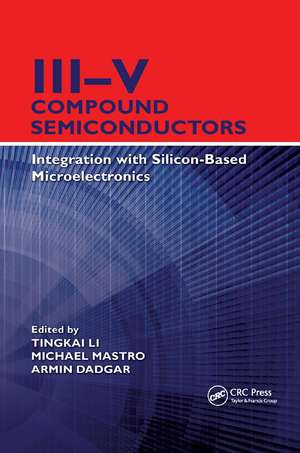III–V Compound Semiconductors: Integration with Silicon-Based Microelectronics
Editat de Tingkai Li, Michael Mastro, Armin Dadgaren Limba Engleză Paperback – 23 sep 2019
III-V Compound Semiconductors: Integration with Silicon-Based Microelectronics covers recent progress in this area, addressing the two major revolutions occurring in the semiconductor industry: integration of compound semiconductors into Si microelectronics, and their fabrication on large-area Si substrates. The authors present a scientific and technological exploration of GaN, GaAs, and III-V compound semiconductor devices within Si microelectronics, building a fundamental foundation to help readers deal with relevant design and application issues.
Explores silicon-based CMOS applications developed within the cutting-edge DARPA program
Providing an overview of systems, devices, and their component materials, this book:
- Describes structure, phase diagrams, and physical and chemical properties of III-V and Si materials, as well as integration challenges
- Focuses on the key merits of GaN, including its importance in commercializing a new class of power diodes and transistors
- Analyzes more traditional III-V materials, discussing their merits and drawbacks for device integration with Si microelectronics
- Elucidates properties of III-V semiconductors and describes approaches to evaluate and characterize their attributes
- Introduces novel technologies for the measurement and evaluation of material quality and device properties
- Investi
| Toate formatele și edițiile | Preț | Express |
|---|---|---|
| Paperback (1) | 489.26 lei 6-8 săpt. | |
| CRC Press – 23 sep 2019 | 489.26 lei 6-8 săpt. | |
| Hardback (1) | 1561.41 lei 6-8 săpt. | |
| CRC Press – 2 dec 2010 | 1561.41 lei 6-8 săpt. |
Preț: 489.26 lei
Preț vechi: 575.60 lei
-15% Nou
Puncte Express: 734
Preț estimativ în valută:
93.63€ • 97.39$ • 77.30£
93.63€ • 97.39$ • 77.30£
Carte tipărită la comandă
Livrare economică 15-29 aprilie
Preluare comenzi: 021 569.72.76
Specificații
ISBN-13: 9780367383268
ISBN-10: 0367383268
Pagini: 603
Dimensiuni: 156 x 234 x 33 mm
Greutate: 0.45 kg
Ediția:1
Editura: CRC Press
Colecția CRC Press
ISBN-10: 0367383268
Pagini: 603
Dimensiuni: 156 x 234 x 33 mm
Greutate: 0.45 kg
Ediția:1
Editura: CRC Press
Colecția CRC Press
Public țintă
Professional Practice & DevelopmentCuprins
Part I: Basic Physical and Chemical Properties Fundamentals and the Future of Semiconductor Device Technology. The Challenge of III–V Materials Integration with Si Microelectronics.
Part II: GaN and Related Alloys on Silicon Growth and Integration Techniques III-Nitrides on Si Substrate. New Technology Approaches.
Part III: III–V Materials and Device Integration Processes with Si Microelectronics Group III-A Nitrides on Si: Stress and Microstructural Evolution. Direct Growth of III–V Devices on Silicon. Optoelectronic Device Integrated on Si. Reliability of III–V Electronic Devices.
Part IV: Defect and Properties Evaluation and Characterization In Situ Curvature Measurements, Strains, and Stresses in the Case of Large Wafer Bending and Multilayer Systems. X-Ray Characterization of Group III-Nitrides. Luminescence in GaN.
Part V: Device Structures and Properties GaN-Based Optical Devices on Silicon. The Conventional III–V Materials and Devices on Silicon III–V Solar Cells on Silicon.
Part II: GaN and Related Alloys on Silicon Growth and Integration Techniques III-Nitrides on Si Substrate. New Technology Approaches.
Part III: III–V Materials and Device Integration Processes with Si Microelectronics Group III-A Nitrides on Si: Stress and Microstructural Evolution. Direct Growth of III–V Devices on Silicon. Optoelectronic Device Integrated on Si. Reliability of III–V Electronic Devices.
Part IV: Defect and Properties Evaluation and Characterization In Situ Curvature Measurements, Strains, and Stresses in the Case of Large Wafer Bending and Multilayer Systems. X-Ray Characterization of Group III-Nitrides. Luminescence in GaN.
Part V: Device Structures and Properties GaN-Based Optical Devices on Silicon. The Conventional III–V Materials and Devices on Silicon III–V Solar Cells on Silicon.
Notă biografică
Tingkai Li, Ph.D., is currently working at Micron Technology, Inc. as a senior technical member. He published over 100 technical papers, edited three preceding books, and was granted 93 US patents and many awards related in semiconductor and compound semiconductor device and materials research. He is an invited paper reviewer of the Applied Physics Letter, Journal of Applied Physics, IEEE Electron Device Letter, IEEE Transaction of Electron Device, etc., and overseas editor of Journal of Inorganic Materials. He is also honorary professor at Hunan University, Wuhan University of Technologies, and Zhejiang University in China. Dr. Li received a Ph.D. degree in Materials Science and Engineering from Zhejiang University, P. R. China, in 1987, and was a postdoctoral fellow and research scientist at Virginia Polytechnic Institute and State University, Blacksburg, Virginia from 1989-1995. From 1995-1998, he worked as a Staff Scientist in EMCORE Cooperation, New Jersey. He joined Sharp Laboratories in 1998 as a principal member of technical staff and project manager.
Michael Mastro, currently a civilian staff scientist at the U.S. Naval Research Lab, has more than 10 years of research experience in thin film growth and characterization, as well as semiconductor device design and nano-fabrication. This includes a number of fundamental advances in the fabrication of planar LEDs and high-power electronic devices, in addition to the development of novel nano-devices, which has resulted in authorship on more than 100 papers and patents. Michael earned a Ph.D. from the University of Florida in 2001 and a B.S. in Chemical Engineering from the Johns Hopkins University in 1997.
Armin Dadgar studied physics at University of Heidelberg and at TU-Berlin, where he received his doctor of natural sciences in 1999, successfully developing an alternative method to Fe doping to obtain semiinsulating InP b
Michael Mastro, currently a civilian staff scientist at the U.S. Naval Research Lab, has more than 10 years of research experience in thin film growth and characterization, as well as semiconductor device design and nano-fabrication. This includes a number of fundamental advances in the fabrication of planar LEDs and high-power electronic devices, in addition to the development of novel nano-devices, which has resulted in authorship on more than 100 papers and patents. Michael earned a Ph.D. from the University of Florida in 2001 and a B.S. in Chemical Engineering from the Johns Hopkins University in 1997.
Armin Dadgar studied physics at University of Heidelberg and at TU-Berlin, where he received his doctor of natural sciences in 1999, successfully developing an alternative method to Fe doping to obtain semiinsulating InP b
Descriere
A discussion of recent advances, this book covers the scientific and technological exploration of the applications, properties, and processes of GaN, GaAs, and other III-V compound semiconductor devices within Si-based technology. It includes a broad range of topics, from fundamental material properties and materials integration to demonstration and industrial devices. The book also contains discussions of materials and devices, including their basic physical and chemical properties, their mechanisms, how to measure their properties, and how to fabricate them.





